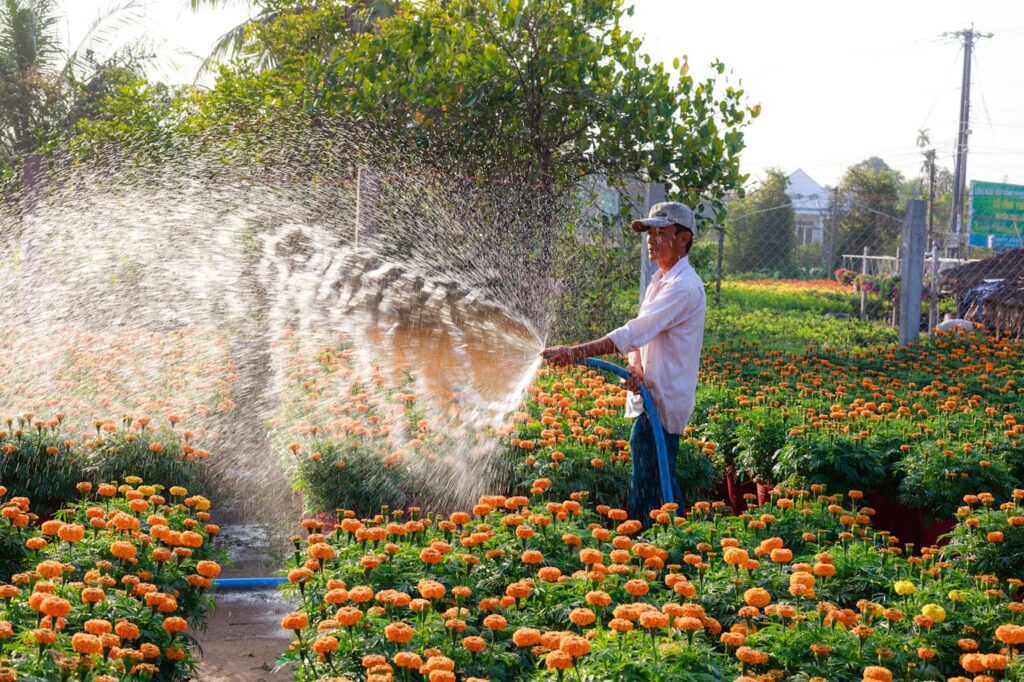Organic farming practices have gained significant momentum in India as farmers and consumers alike recognize the importance of sustainable agriculture. Central to organic farming are organic fertilizers and pesticides, which promote soil health, enhance crop nutrition, and minimize environmental impact compared to conventional chemical inputs. This article explores the significance, types, benefits, challenges, and government support related to organic fertilizers and pesticides for Indian farmers.

Significance of Organic Fertilizers and Pesticides
Organic fertilizers and pesticides play a crucial role in sustainable agriculture for the following reasons:
Soil Health: Organic fertilizers enrich soil fertility, improve soil structure, and promote microbial activity, enhancing long-term productivity and sustainability of agricultural land.
Crop Nutrition: Organic fertilizers provide slow-release nutrients that are gradually made available to plants, ensuring balanced nutrition and healthy crop growth without adverse effects on soil or water quality.
Environmental Protection: Organic farming minimizes chemical runoff, soil erosion, and pollution, conserving biodiversity, preserving natural resources, and promoting ecological balance.
Health Benefits: Organic pesticides derived from natural sources pose fewer health risks to farmers, consumers, and beneficial organisms compared to synthetic chemical pesticides.

Types of Organic Fertilizers
Compost: Decomposed organic matter such as kitchen waste, crop residues, and animal manure used to improve soil fertility, moisture retention, and nutrient availability to plants.
Biofertilizers: Microbial inoculants containing beneficial bacteria (e.g., Rhizobium, Azotobacter) or fungi (e.g., Mycorrhizae) that enhance nutrient uptake, nitrogen fixation, and overall plant health.
Green Manure: Cover crops like legumes (e.g., clover, peas) and grasses (e.g., rye, oats) grown and incorporated into the soil to add organic matter, improve soil structure, and replenish nutrients.
Organic Amendments: Natural substances such as seaweed extracts, fish emulsion, bone meal, and rock phosphate that supply essential nutrients and trace elements to crops.

Types of Organic Pesticides
Botanical Pesticides: Derived from plants with insecticidal properties, such as neem oil (Azadirachtin), pyrethrum (from chrysanthemum flowers), and garlic extract, used to repel or control pests.
Microbial Pesticides: Biocontrol agents like Bacillus thuringiensis (Bt), Trichoderma spp., and Beauveria bassiana that target specific pests or diseases without harming beneficial insects or the environment.
Mineral-based Pesticides: Natural minerals such as diatomaceous earth (silica-based) and kaolin clay used for pest control by physical action or as repellents.
Biopesticides: Living organisms like predatory insects, parasitoids, and nematodes that prey on pests or disrupt their life cycles, offering sustainable pest management solutions.

Benefits of Organic Fertilizers and Pesticides
Improved Soil Health: Enhance soil fertility, structure, and water-holding capacity, promoting healthier root systems and sustainable crop production.
Safe and Nutritious Produce: Minimize chemical residues in food, ensuring safe consumption and meeting consumer demand for organic and healthy food choices.
Environmental Sustainability: Reduce environmental pollution, conserve water resources, and support biodiversity conservation by maintaining natural ecosystems.
Cost-effectiveness: Long-term benefits include reduced input costs, improved crop resilience to pests and diseases, and enhanced farm profitability over successive cropping seasons.

Challenges in Adopting Organic Practices
Knowledge and Awareness: Limited awareness and technical knowledge among farmers about organic farming principles, methods, and benefits hinder widespread adoption.
Transition Period: Initial challenges during the transition from conventional to organic farming, including yield fluctuations, weed management, and soil nutrient balancing.
Market Access and Certification: Obtaining organic certification, meeting certification requirements, and accessing organic markets with premium prices pose barriers for smallholder farmers.
Scaling Up: Scaling up organic farming practices to meet growing demand while maintaining ecological integrity and ensuring food security remains a challenge.

Government Support and Initiatives
The Indian government promotes organic farming through various initiatives and support mechanisms:
Paramparagat Krishi Vikas Yojana (PKVY): Promotes organic farming practices among farmers, providing financial assistance, training, and organic certification support.
National Mission on Organic Farming (NMOF): Implements policies, subsidies, and capacity-building programs to enhance organic farming adoption and market access.
Organic Farming Schemes: Provides subsidies for organic inputs, biofertilizers, biopesticides, and organic certification costs under different agricultural schemes.
Market Development: Facilitates market linkages, organic produce certification, and promotion of organic farming through awareness campaigns and farmer training programs.

Future Outlook and Conclusion
Organic fertilizers and pesticides offer sustainable alternatives to conventional agricultural inputs, promoting soil health, environmental sustainability, and human well-being. By supporting farmers in adopting organic practices, enhancing market access, and investing in research and development, India can foster a thriving organic farming sector capable of meeting domestic and international demand for organic produce.
In conclusion, embracing organic fertilizers and pesticides is essential for advancing sustainable agriculture in India, safeguarding natural resources, and ensuring food security for future generations. Through collaborative efforts among farmers, policymakers, researchers, and consumers, India can achieve agricultural sustainability goals and contribute to global efforts in environmental conservation and sustainable development.